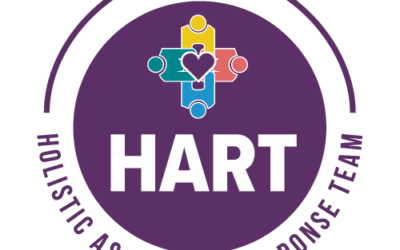 This blog post on data collection is guest authored by Eric Estrada, Executive Director of form communities, which operates community mental health and workforce development programs such as the San Antonio Clubhouse, Peer Academy, and PeerForce. He will be presenting at the Robert Lee Sutherland Seminar in the Data and Evaluation track. The views expressed in this blog post are those of the author.
This blog post on data collection is guest authored by Eric Estrada, Executive Director of form communities, which operates community mental health and workforce development programs such as the San Antonio Clubhouse, Peer Academy, and PeerForce. He will be presenting at the Robert Lee Sutherland Seminar in the Data and Evaluation track. The views expressed in this blog post are those of the author.
We’ve all heard, or maybe even said, versions of these statements:
“We don’t want to alienate the people we serve by asking them questions.”
“We’re not a clinical organization, so we don’t collect data.”
“We don’t have the staff to collect data.”
It’s easy to make excuses to avoid data collection, hoping that you’ll find a funding partner that just “gets you” and won’t ask for any data. The reality is that our funding partners need to make difficult prioritization decisions, and they need to be accountable for those decisions. Sharing data helps them help you.
Here are three common reasons why nonprofits struggle with data collection and how to overcome them:
We Have Cultural and Relationship Concerns
In programs focused on building close relationships with the individuals who are supported, such as Peer Support and Clubhouses, collecting data can feel unnatural. It can feel like a way of “othering” people.
There’s definitely a sweet spot between collecting no data at all and collecting a person’s whole life story. Consider starting small, asking for just names and contact info for example. Then, collect more information as the relationship evolves. People are used to providing information when they get services. Receiving support from us is no different. People are often happy to share information – we just need to ask.
The key is to feel comfortable asking. We’re often reluctant to ask because it “feels” overly clinical or formal. It doesn’t have to be. It’s completely possible to maintain a level of collegiality and feelings of equality while also gathering information that is mutually beneficial.
We overcomplicate and overthink the data collection
We’re probably not trying to create a peer-reviewed academic study. Yet many of us think that our funding partners are expecting that level of rigor from us. They usually are not.
We want funding partners to trust our instincts and program design and they often do.
If you propose a project that is overly complex or that requires too much of you, why would the funder ask you to “simplify” it? If you understand your program and what it will take to deliver it, then you should be able to propose data metrics that your team can easily understand, accurately collect, and consistently report. Your funding partners will assume you know what you’re talking about.
This trust will often translate to the people you serve. This means that self-reported data is usually acceptable as long as you’ve got a clear understanding of how you’ll collect it and you do it consistently.
You don’t need to conduct academic research to prove that someone’s life is better because of the help you provide. Data collection can be as simple as asking someone to agree or disagree with statements about the impact of your services.
You can propose your data collection measures to a potential funding partner. It’s up to them to accept your proposals or not. If they’re insufficient for them, then maybe you simply haven’t found the right funding partner yet.
We Have Basic Infrastructure Issues
We often think we need to have specialized staff to collect or analyze data.
If you’ve got a clear program and accessible metrics to report, then your infrastructure needs are immediately less complicated, and you’re likely able to make do without specialized staff. There are also plenty of resources available to help you.
While customized databases and survey instruments would make your life easier, you can likely make do with off-the-shelf tools, or even well-constructed spreadsheets. A short session with an AI tool can help you identify ways to “validate” and “standardize” your spreadsheets or database. It can also help you create data collection structures that set you up for success.
Alternatively, with proper planning and a small budget, you can contract someone to help plan your data collection processes and set up your tools. This may seem like a luxury, but it’s a lot more affordable to hire an expensive professional for a few hours (or days) to build an easy-to-use tool than to have a staff member try to make sense of messy data on an ongoing basis.
You’ve Got This!
There’s no reason to shy away from data collection. Don’t be afraid to design a program that makes sense to you and your team. A clear program is easier to explain and to implement. You’re working to make our community a better place – don’t make your life more complicated than it needs to be!
Related Content
Three Things to Know About Meeting with Policymakers
From the Robert Lee Sutherland Seminar Policy Pre-seminar, here are three things to know about meeting with policymakers.
Rising Voices: Telling Your Story
When personal stories are shared with policymakers, not only do they draw attention to important issues, but they also resonate in ways that facts and data alone cannot.
2025-2026 Mini-Grants for Innovation, Capacity-Building, and Community Well-Being
The Hogg Foundation is pleased to announce the recipients of the 2025 Robert Lee Sutherland Mini-Grants.
Toward a More Effective 911 Alternative
This blog post is guest authored by Larry D. Brown Jr., PhD, associate director for Community Health and Violence Prevention Services at Harris County Public Health. He presented a session at the Robert Lee Sutherland Seminar as part of the Building Partnerships and Collaboration track.
Stronger Together
This blog post is guest authored by Doug Beach, executive director of NAMI Greater San Antonio. He will be presenting at the Robert Lee Sutherland Seminar in the Building Partnerships and Collaboration track.
Rhythms of Resilience: An Early Look at the Robert Lee Sutherland Seminar
This year’s RLS seminar will feature a keynote experience unlike any other—a powerful blend of rhythm, connection, and healing led by Grammy Award–winning percussionist Nina Rodriguez.






